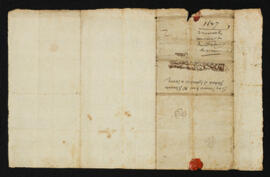Asks if he will give a proxy for him on the Universities Admission Bill
To begin studying Greek Testament, has been recommended Roger L'Estrange 'Seneca's Morals' by way of abstract, Burn obliged for JHM's Life of Bentley
Will pass through London between 5th and 9th.
Granting Fletcher's application for Wittgenstein to be admitted as an advanced student.
City Library, Bristol. - Wordsworth had asked him to find a copy of Gilbert's Hurricane for Milnes; now sends one on Wordsworth's behalf which came to Peace by chance; has inserted own book ticket showing a room know to Gilbert and Wordsworth.
General material: for individual cases of relief by the Fund see alphabetical sequence.
Stafford House. - Thanks for book; will subscribe for the Poet’s sisters.
West Audley Street, (London).—Sends accounts of Davie and Edwards for 1746 and 1747.
(Franked by Firebrace.)
—————
Transcript
S[i]r
The first paper I saw when I opend the drawer was the inclosd Acc[oun]ts of Davie & Edwards for the years 1746 & 1747. & therefore take the earliest opportunity. to send ’em, & a Line to notifie their being come safe to hand will very much oblige
S[i]r
Y[ou]r Humble Serv[an]t
C. Firebrace
W Audley Street
Feb the 21st 1750
[Superscription:] To | Mr Goodchild Clark† | Attorney at Law | in Ipswich | Suffolk [At the foot:] Free | C. Firebrace
—————
Postmarked 21 February and ‘AC’. Dawson Turner has added at the foot in pencil, ‘M P for Ipswich’ in pencil alongside the signature. There are a few irregular spellings. Letters missing from words abbreviated by superscript letters have been supplied in square brackets.
† Sic.
With 'Memoranda of that Part of the Campaign 1794 comprized between the 22nd of May & the 25th July' and battle plans drawn by William Frederick of engagements between 17-30 Apr 1794.
Also a 'Memorandum concerning the Letters of W. F. Duke of Gloucester addressed to his father Wm Henry Duke of Gloucester during the Campaigns of 1794 & 1799', by his sister Princess Sophia Matilda, 28 Dec 1837. Sophia Matilda labelled and sealed the paper wrappers in which the files of letters were originally sent, and also the linen bag in which they were all contained.
The letters date from 1794, when Prince William was fighting in Flanders, 1799, during the campaign in Holland, and 1803-1804, when Prince William was on a tour in northern Europe, and are predominantly written by him to his father.
William Frederick (1776-1834), Prince, 2nd Duke of Gloucester and EdinburghLetters from Augusta Julia Babington, née Noel, to her father in law Thomas Babington.
Letter from C. S[?] B[abington?] to Mary Ellen Rose, née Parker. Letters from Catherine Babington, née Whitter, to her brother in law Thomas Babington. Letter from Charles Cardale Babington to his uncle Thomas Babington. Letters from Charles Edward Babington to his aunt Mary Parker, née Babington.
Letter from Charles Roos Babington to his sister Jean Babington; letters to his father Thomas Babington, and sister Mary Babington.
Letter from Elizabeth Babington, later Strange, to her uncle Thomas Babington. Letters from Frances Babington, née Sykes, to her sisters in law Maria Frances Babington (née Pratt) and Mary Parker (née Babington). This last includes a note from her husband Matthew Babington to his sister Mary.
Downing Street - Canonry at Canterbury.
List of books - accounts, exit and redit books etc - with Wren Library reference numbers assigned to each. MS pencil note at top, '(Most) 1932 now in Muniment Room (behind Clock)'. Pencil annotations state which books remain in the Library, with the initials 'AH' [Arthur Halcrow?]. MS pencil note at bottom: 'Most of these volumes are stored in the Tower muniment room (behind clock). Nov. 1932 C.B.H. [Cecil Baldwin Hurry]'.
Only 13 pp. long, rest of journal blank.
